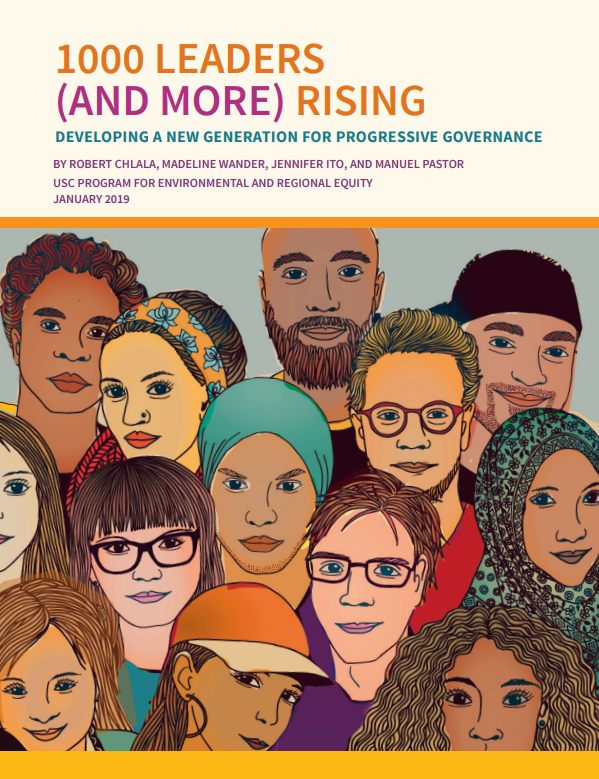
January 23, 2019
By Robert Chlala, Madeline Wander, Jennifer Ito, and Manuel Pastor
Please note: reports dated earlier than June 2020 were published under our previous names: the USC Program for Environmental and Regional Equity (PERE) or the USC Center for the Study of Immigrant Integration (CSII).
Progressive leaders took the 2018 elections by storm (think Alexandria Ocasio-Cortez from New York, Rashida Tlaib from Michigan, and Deb Haaland from New Mexico, to name a few) and reenergized social justice efforts from the national stage. But before these leaders took on Congress, there were myriad local transformations that set the groundwork for this recent progressive wave. In the last decade, movements have created strategic leadership development programs that inspire and prepare grassroots leaders to run for local office—which creates the conditions for leaders to pursue higher office.
The 1000 Leaders (and More) Rising report aims to bring to light such leadership development efforts—particularly Working Partnerships USA’s 1000 Leaders Project and similar programs, like the Oregon Futures Lab—and their local impacts. These programs train grassroots leaders to run for office as well as support and equip them with the technical knowledge and political know-how to help them succeed in passing and implementing policies once elected.
What makes this model of leadership development unique—and what lays the groundwork for sustaining and scaling it—is that it is designed as part of broader strategies and is implemented in tandem with local and regional efforts working to achieve governing power. To this end, 1000 Leaders and similar programs also prepare those leaders typically considered “on the outside” to work in a “governing coalition” with each other and electeds that far outlasts any election cycle.
Download report
Looking across these training programs, we identify three central tenets to leadership development for progressive governance:
- Lead collectively. Transformational change happens when individuals—electeds on the inside and movement builders on the outside—work collectively toward a shared agenda and collaborate in ways that redistribute power.
- Lead with values. Centering around shared values, rather than narrow issues or individual aspirations, motivates leaders to stay true to their communities of origin and serves as a “true north” toward which a governing coalition can aim.
- Lead toward governing power. Providing the ability to navigate often-opaque technical government processes and to play a power-shifting role from the “inside”—a new realm for many progressive movements—is critical to helping pass, implement, and sustain long-term change.
Taken together, these tenets create a model of shared governance that is delivering on its promise to deepen democracy and expand inclusivity on issues like wages, job opportunity, and violence prevention. 1000 Leaders and similar programs are proving it is not just about changing the face in government, but how and for whom leadership works. In so doing, they have provided a blueprint that holds the possibility to take us from a wave of progressives in government today to a steady stream of community-rooted leaders reshaping governance for generations to come.



